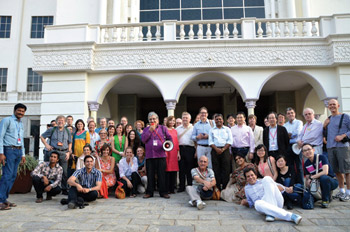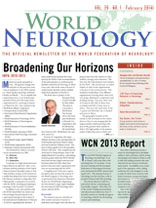By Thomas H. Bak and Facundo Manes

Attendees and participants in Hyderabad.
The WFN Research Group on Aphasia, Dementia and Cognitive Disorders (RG ADCD) goes back to the Problem Commission on Aphasiology, founded in Varenna on Lago di Como in 1966, as one of the first “problem commissions” (as the research groups were initially called) of the WFN.
From early on, the group’s activities have been strongly influenced by two complementary developments. The first one is the continuous move toward a broader, interdisciplinary, collaborative and integrative approach. Early in its history, the group recognized the close connection between aphasia and other aspects of cognition.
Cognitive symptoms can occur in a wide range of neurological diseases, such as stroke, neurodegeneration, inflammation, neoplasms, trauma, epilepsy or even migraine. Accordingly, our group has always been keen to establish collaborations with other research groups. The most lasting and fruitful one has been the collaboration with the WFN Research Group on Motor Diseases (RG MD). It has been given a strong impetus by recent advances in clinical studies as well as in basic sciences, such as the discovery of the C9ORF72 gene, which can cause both Motor Neuron Disease (MND) as well as Frontotemporal Dementia (FTD).
Within a few years, MND changed from a classical prototype of a purely motor disorder to a prime example of the overlap between movement and cognition. The collaboration between RG ADCD and RG MD kept up with these developments. We have organized joint symposia and teaching courses across the world and the official journal of the RG MD, Amyotrophic Lateral Sclerosis, has been renamed to Amyotrophic Lateral Sclerosis and Frontotemporal Degenerations and is now also endorsed by our group.
The second development, which has defined our activities in the last decades, is a move to an increasingly global perspective. Originally, the biennial meetings of the group alternated between North America and Western Europe. From the late 20th century, they expanded to encompass Central/Eastern Europe (Prague), South America (Praia do Forte, Buenos Aires) and Asia (Istanbul, Hyderabad) with the next meeting due to take place in Hong Kong this year.
This has led with time to an increasingly diverse, international membership as well as to a more global focus of our meetings. Thanks to the Cognitive Clinics Worldwide grant from the WFN, our group has been able to organize teaching courses in cognitive neurology in Hyderabad, Kolkata and Bangalore in India, as well as in Beijing, Ulan Bator, Havana and Cartagena.
We are in process of establishing local networks of expertise throughout the world as well as websites containing relevant information about cognitive tests available in different countries and languages. This will provide valuable information to practitioners wishing to establish cognitive clinics in their countries.
An important part of our strategy to be globally inclusive is to make sure that our meetings and courses are affordable to everyone interested. This is particularly relevant for the young neurologists, who we welcome into our group as members of Forum of Young Researchers (FYRE). At our last meeting in Hyderabad, the FYRE members were invited to stay free of charge with local families, a way of creating personal friendships as well as professional partnerships.
These activities belong to the very core of our mission. Our growing interaction with neurologists across the world made us increasingly aware of the importance of linguistic, cultural and social factors in the diagnosis and treatment of aphasia, dementia and cognitive disorders. The same disease, such as FTD, can present differently in different countries and cultures1—an observation that has to be taken into account when developing universally applicable diagnostic criteria. Likewise, cognitive tests cannot be applied across the world without being properly translated, adapted and validated. But the challenge of a global approach to cognitive disorders also brings opportunities.
Studies extending beyond the Western world can avoid certain confounding variables and contribute to new insights, as illustrated by recent research on the relationship between bilingualism and dementia2. Our courses and meetings highlight such topics, raise the awareness and offer practical advice and help to researchers as well as clinicians. We hope that in the future, while consolidating our programs in Asia and Latin America, we will be able to extend our activities further to encompass Africa.
The recent change in our name to the WFN Research Group on Aphasia, Dementia and Cognitive Disorders (RG ADCD) is the next, logical step in our group’s continuous development. The change was suggested at the World Congress of Neurology in Vienna and approved by the WFN Nov. 1, 2013.
The new name reflects changes, which have happened in the group gradually over the past decades. A large number of our members focus their research on different types of dementia, in particular FTD1,3, as well as Alzheimer’s Disease and vascular dementia2.Our biennial meetings as well as our teaching courses cover many dementia-relevant topics, with a particular emphasis on cognitive assessment. Moreover, research on progressive aphasias, reflected in the recent diagnostic criteria4 brought together aphasias and dementias, highlighting clinical as well as biological connections between both disease groups.
We hope that the broader scope of our group will attract both scientists and clinicians from all over the world with an interest in research on aphasia, dementia or any other cognitive disorder.
If you are interested in joining the group or attending our biennial meeting in December 2014 in Hong Kong, contact thomas.bak@ed.ac.uk.
Bak and Manes are the chair and co-chair, respectively, of the WFN Research Group on Aphasia, Dementia and Cognitive Disorders.
References
- Ghosh A, Dutt A, Ghosh M, Bhargava P, Rao S. Using the revised diagnostic criteria for Frontotemporal Dementia in India: Evidence of an advanced and florid disease. PloS one. 2013;8(4):e60999.
- Alladi S, Bak TH, Duggirala V, Surampudi B, Shailaja M, Shukla AK, et al. Bilingualism delays age at onset of dementia, independent of education and immigration status. Neurology. 2013;81(22):1938-44.
- Rascovsky K, Hodges JR, Knopman D, Mendez MF, Kramer JH, Neuhaus J, et al. Sensitivity of revised diagnostic criteria for the behavioural variant of frontotemporal dementia. Brain. 2011;134:2456–2477.
- Gorno-Tempini ML, Hillis AE, Weintraub S, Kertesz A, Mendez M, Cappa SF et al. Classification of primary progressive aphasia and its variants. Neurology. 2011;76(11):1006-14.
